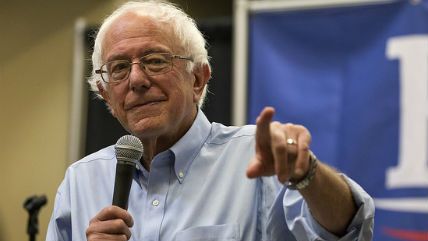Is the Bernie Sanders Poll Surge Real?
Some reasons to be skeptical the Vermonter has what it takes to win the Democratic nomination


As late as January 10, 2008—or almost exactly eight years ago—former Arkansas Gov. Mike Huckabee was beating Arizona Sen. John McCain in the RealClearPolitics Republican primary polling average. Four years later, the lead for the GOP nod changed hands five times between New Year's Day and early March.
What's my point? A lot can happen in the first few months of an election year. And a snapshot taken today may tell you nothing about the final outcome of a race.
In fact, things are changing fast in the 2016 race right now. Less than 20 days out from the Iowa caucuses (which are happening a month later, it should be noted, than in the previous two cycles) Vermont Sen. Bernie Sanders appears to be closing the gap with Democratic frontrunner Hillary Clinton.
The RCP polling average went from giving the former secretary of state a 25-point lead on December 20 to giving her an eight-point lead today. And a new poll from Investors Business Daily has her up just four points nationwide.
At the state level, the news for Clinton is even more grim. The RCP Iowa average has the two Democratic hopefuls in a statistical tie and the RCP New Hampshire average has Sanders ahead by six. So the momentum definitely appears to be in the "democratic socialist" senator's favor.
Does this mean he's likely to actually win the nomination? I wouldn't go that far. As mentioned earlier, public polling this time of year is susceptible to violent swings. And the betting markets continue to see Clinton as the overwhelming favorite.
Part of what's going on here is that, believe it or not, a lot of Americans are only just starting to tune in to the election. In a mid-December CNN/ORC poll, more than half of Republicans and Republican leaners said they didn't even watch the marquee GOP debate held on the 15th of that month. And as I've noted before, Google searches for terms like "Republican primary" spiked in January of the last two presidential years as voters began to do their research.
Many Americans still know very little about some of the major candidates. An online YouGov poll taken the first week of this month found that nearly one in five Americans weren't sure if they had a favorable or an unfavorable view of Bernie Sanders. On the Republican side, 28 percent didn't know what they thought of Carly Fiorina and ditto for Rand Paul.
So voters have a lot to learn. They'll do this by watching the upcoming debates and reading the news—but also by tracking how the various candidates do in the early primary states and by passively absorbing the barrage of campaign ads that are starting in earnest only now. Over the next eight weeks, many of them will change their minds, perhaps repeatedly, about who they believe is best-suited to lead the country.
The polls will do their best to wring from people meaningful data about how the election will turn out. But that's not as simple as it might sound.
(Editor's note: Check back tomorrow morning for a deep dive from the February issue on why polling is so gosh-darn hard to do well these days.)
One of the major challenges pollsters face is predicting which of the people they interview will actually turn out to cast a ballot. Not guessing right can very easily lead you to the wrong conclusion, a new report from Pew Research Center has found.
The outfit interviewed registered voters before the 2014 midterms, asking whether they planned to vote for the Republican or the Democratic candidate for House of Representatives. In September, Pew's researchers found 42 percent going for Democrats compared to 38 percent going for Republicans. But come November, Republicans garnered 51 percent to Democrats' 46 percent.
What happened? According to the study, the missed pre-election call was not the result of people changing their minds—it was a result of more Democrats choosing to stay home on Election Day than Republicans:
Fully 73% of pre-election registered voters who supported a Republican candidate in the pre-election survey ultimately turned out to vote on Election Day, based on verified vote from the voter file. By comparison, only 61% of registered voters who supported a Democratic candidate were verified to have voted.
All of which is a long way of saying that, yes, Bernie Sanders is doing well in the polls at the moment. But if a lot of the people who say they support you don't show up to actually vote, those strong polling numbers mean very little.
Turnout matters, and it's not yet clear whether the largely grassroots Sanders campaign can compete with the Clinton machine at getting warm bodies to their polling places. On that, only time will tell.


Show Comments (75)